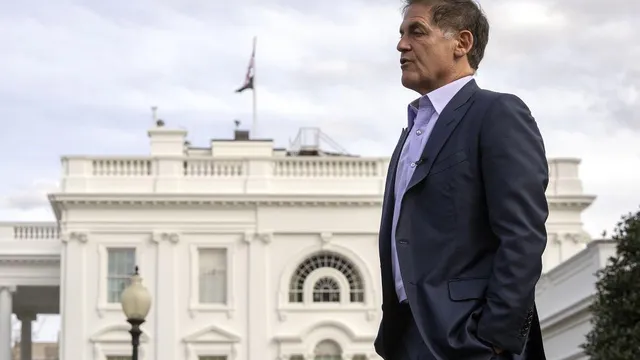
Not Enjoying the Mark Cuban for President Campaign
2024-09-27 00:00- Mark Cuban has been vocal in his criticism of Donald Trump's economic policies, particularly regarding tariffs and outsourcing.
- Cuban's comments align with the Harris campaign's messaging, as they aim to counter Trump's influence ahead of a broader campaign rollout.
- His approach has raised concerns about his understanding of economic issues and the implications of his support for companies that outsource jobs.
Express your sentiment!
Insights
In a recent discussion, Mark Cuban expressed his disapproval of Donald Trump's economic strategies, particularly focusing on tariffs imposed on Mexican-made goods. He argued that such tariffs could inadvertently benefit Chinese manufacturers, potentially harming American companies like John Deere. Cuban's comments were made in the context of the Harris campaign's efforts to counter Trump's economic messaging ahead of a broader campaign launch. His remarks were significant enough that the Harris campaign decided to release the entire video of the call on YouTube, showcasing their alignment with Cuban's views. Cuban's criticism of Trump also included a comparison to Bernie Sanders, highlighting the irony of Trump engaging in price controls, a concept typically associated with socialist policies. This comparison underscores the complexities of the current political landscape, where economic policies are often debated across party lines. Despite his criticisms, Cuban's support for certain companies that outsource jobs has raised eyebrows, suggesting a disconnect between his public persona and the realities of economic policy. The Harris campaign seems to be utilizing Cuban's celebrity status to attract attention and support, but his understanding of the issues at hand has been questioned. Critics argue that his approach mirrors some of the problematic traits seen in Trump's presidency, such as making rash judgments without fully grasping the implications. As the campaign progresses, it remains to be seen how Cuban's involvement will influence public perception and whether his economic insights will resonate with voters. The ongoing dialogue about outsourcing and economic regulation will likely play a crucial role in shaping the campaign's narrative moving forward.
Contexts
In the heated landscape of American politics, Mark Cuban has emerged as a vocal critic of Donald Trump's economic policies while expressing support for Kamala Harris. Initially backing Trump in his first presidential campaign, Cuban later endorsed Hillary Clinton in 2016, citing concerns over Trump's erratic style and lack of clarity in his proposals. As the 2024 election approaches, Cuban's focus has shifted to Harris, whom he believes offers a more coherent and beneficial economic vision for the country. Cuban's criticism of Trump centers on the former president's sweeping tariff proposals, which he argues could harm American businesses and consumers. He specifically pointed out the potential devastation to historic companies like John Deere if Trump’s tariffs were implemented. Cuban contends that while strategic tariffs can be beneficial, across-the-board tariffs are inflationary and ultimately a tax on the American people. In contrast, he views Harris's proposed corporate tax rate as more favorable for businesses, particularly those reliant on imports. As Harris campaigns, she has sought to differentiate her economic policies from Trump's, emphasizing a more serious and strategic approach to tariffs and trade. During a recent speech, she criticized Trump's lack of seriousness regarding economic issues, asserting that a thoughtful plan is essential for addressing the challenges facing American families. Her campaign aims to appeal to centrist voters who may have previously aligned with Republican candidates but are now wary of Trump's unpredictable agenda. Cuban's endorsement of Harris reflects a broader sentiment among some business leaders who are eager for a return to stability and strategic economic planning. As the election draws near, the contrast between Harris's detailed proposals and Trump's populist rhetoric will likely play a crucial role in shaping voter perceptions and decisions.